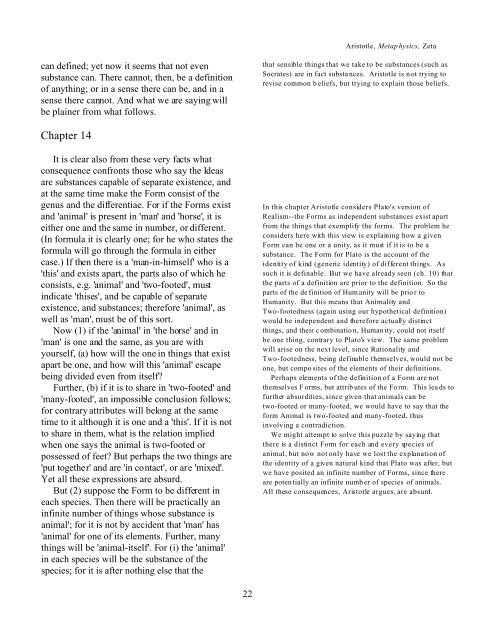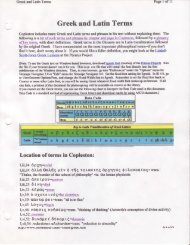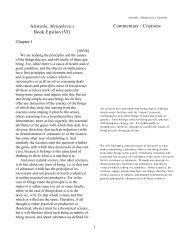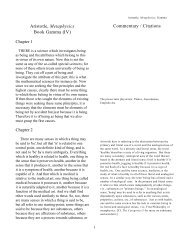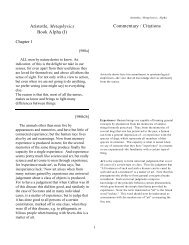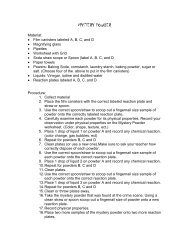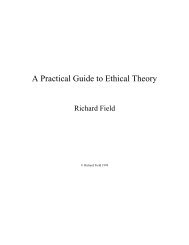Aristotle, Metaphysics Book Zeta (VII) Commentary ... - CATpages
Aristotle, Metaphysics Book Zeta (VII) Commentary ... - CATpages
Aristotle, Metaphysics Book Zeta (VII) Commentary ... - CATpages
You also want an ePaper? Increase the reach of your titles
YUMPU automatically turns print PDFs into web optimized ePapers that Google loves.
<strong>Aristotle</strong>, <strong>Metaphysics</strong>, <strong>Zeta</strong><br />
can defined; yet now it seems that not even<br />
substance can. There cannot, then, be a definition<br />
of anything; or in a sense there can be, and in a<br />
sense there cannot. And what we are saying will<br />
be plainer from what follows.<br />
that sensible things that we take to be substances (such as<br />
Socrates) are in fact substances. <strong>Aristotle</strong> is not trying to<br />
revise common b eliefs, but trying to explain those beliefs.<br />
Chapter 14<br />
It is clear also from these very facts what<br />
consequence confronts those who say the Ideas<br />
are substances capable of separate existence, and<br />
at the same time make the Form consist of the<br />
genus and the differentiae. For if the Forms exist<br />
and 'animal' is present in 'man' and 'horse', it is<br />
either one and the same in number, or different.<br />
(In formula it is clearly one; for he who states the<br />
formula will go through the formula in either<br />
case.) If then there is a 'man-in-himself' who is a<br />
'this' and exists apart, the parts also of which he<br />
consists, e.g. 'animal' and 'two-footed', must<br />
indicate 'thises', and be capable of separate<br />
existence, and substances; therefore 'animal', as<br />
well as 'man', must be of this sort.<br />
Now (1) if the 'animal' in 'the horse' and in<br />
'man' is one and the same, as you are with<br />
yourself, (a) how will the one in things that exist<br />
apart be one, and how will this 'animal' escape<br />
being divided even from itself?<br />
Further, (b) if it is to share in 'two-footed' and<br />
'many-footed', an impossible conclusion follows;<br />
for contrary attributes will belong at the same<br />
time to it although it is one and a 'this'. If it is not<br />
to share in them, what is the relation implied<br />
when one says the animal is two-footed or<br />
possessed of feet? But perhaps the two things are<br />
'put together' and are 'in contact', or are 'mixed'.<br />
Yet all these expressions are absurd.<br />
But (2) suppose the Form to be different in<br />
each species. Then there will be practically an<br />
infinite number of things whose substance is<br />
animal'; for it is not by accident that 'man' has<br />
'animal' for one of its elements. Further, many<br />
things will be 'animal-itself'. For (i) the 'animal'<br />
in each species will be the substance of the<br />
species; for it is after nothing else that the<br />
In this chapter <strong>Aristotle</strong> considers Plato's version of<br />
Realism--the Forms as independent substances exist apart<br />
from the things that exemplify the forms. The problem he<br />
considers here with this view is explaining how a given<br />
Form can be one or a unity, as it must if it is to be a<br />
substance. The Form for Plato is the account of the<br />
identity of kind (generic identity) of different things. As<br />
such it is definable. But we have already seen (ch. 10) that<br />
the parts of a definition are prior to the definition. So the<br />
parts of the de finition of Hum anity will be prior to<br />
Humanity. But this means that Animality and<br />
Two-footedness (again using our hypothetical definition)<br />
would be independent and therefore actually distinct<br />
things, and their combination, Humanity, could not itself<br />
be one thing, contrary to Plato's view. The same problem<br />
will arise on the next level, since Rationality and<br />
Two-footedness, being definable themselves, would not be<br />
one, but compo sites of the elements of their definitions.<br />
Perhaps elements of the definition of a Form are not<br />
themselves Forms, but attrib utes of the Form. This leads to<br />
further absurdities, since given that animals can be<br />
two-footed or many-footed, we would have to say that the<br />
form Animal is two-footed and many-footed, thus<br />
involving a contradiction.<br />
We might attempt to solve this puzzle by saying that<br />
there is a distinct Form for each and every species of<br />
animal, but now not only have we lost the explanation of<br />
the identity of a given natural kind that Plato was after, but<br />
we have posited an infinite number of Forms, since there<br />
are potentially an infinite number of species of animals.<br />
All these consequences, <strong>Aristotle</strong> argues, are absurd.<br />
22


